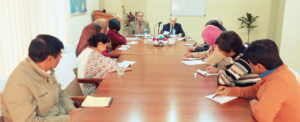Guest Lecture 01/01/2016

Post-event Report
Lt. Gen (R) Talat Masood visited IPRI on November 26, 2015 to deliver lecture on “Afghanistan- A year after drawdown: Challenges and Opportunities”. The lecture was delivered to IPRI scholars in IPRI’s Conference Hall. Following are the salient points of the lecture.
• Pakistan has made genuine efforts to promote official level talks between the Afghan government and the Taliban. It was not an easy task and required serious enticing of both sides.
• The Murree process showed that America, China, NATO, etc. were eager to explore any possibility that can bring the Afghan government and Taliban to talk, or in other words, bring an end to the long war.
• A string of militant attacks in Kabul in August 2015, followed by the Kunduz attack in early October, not only sent shockwaves in the region but also provided an opportunity to detractors of peace process to blame Pakistan.
• The revelation of Mullah Omar’s death only a few days prior to the second round of the Murree talks was a deliberate attempt to further sabotage the process. To protect his credibility, President Ghani blamed Pakistan and distanced himself from the peace talks.
• The irony is that Kunduz is located in the north and over 1,000km away from the Pakistan border. The Afghan leadership blaming Pakistan has become more of a routine reflex and a way of deflecting attention from its own internal weaknesses. Instead of playing the blame game, the Afghan leadership should strengthen ties with Pakistan to face the internal threat.
• Both the civil and military leaderships of Pakistan have been sincerely pursuing the policy of developing close ties with Afghanistan as it is in the interest of both countries to cooperate with each other and institutionalise stronger mechanisms for bilateral cooperation so that both countries could work together to achieve reconciliation between Taliban and other Afghan ethnic groups for the sake of building durable peace in Afghanistan.
• Kunduz attack has widened the cleavage between President Ghani and Abdullah Abdullah, and demonstrated the fragility of the coalition.
• The attack also brought to the fore the fact that the Afghan Army has not fully gained the capability to act as a cohesive combat force capable of holding territory without the aerial and intelligence support of the US and the NATO.
• Talking about the governance issues inside Afghanistan, Lt. Gen (R) Masood explained that although it has been a year since Ghani assumed office of President and Abdullah Abdullah of CEO, yet they have to agree on most of the important appointments. All this affects the quality of governance and such weaknesses play into the hands of the Taliban. The danger is compounded as the Islamic State (IS) is making inroads in Afghanistan, which could be very dangerous for the region as a whole. If the Afghan government fails to deliver, it would only lend strength to the Taliban and other affiliated groups.
• The central question at present is whether the positions of the Taliban and the Afghan government are reconcilable because presently, there is a wide gap in their goals and objectives.
• Within the Taliban, there are two factions and the splinter group refuses to accept the leadership of Mullah Mansoor so any decisions taken by him, in all likelihood, will be opposed.
• The Afghan government is a victim of paralysis due to internal power struggles between President Ghani and Abdullah Abdullah. In this political scenario, a breakthrough will take considerable time and patience.
• Nonetheless, the onset of winter provides a window of opportunity as the fighting will stop. Taliban might not surrender arms at this stage, but they could be persuaded to engage in serious peace negotiations.
• Pakistan has taken possible measures to destroy sanctuaries of extremist groups within its territory and operation Zarb-e-Azb has successfully entered its final phase.
• Lt. General Talat Masood illustrated that all regional and global powers, including China, are opposed to the Taliban. China’s main interest in stabilising Afghanistan is to prevent a spillover effect of the insurgency in its province of Xinjiang and on the CPEC as it wouldn’t want its economic interests to be compromised.
• President Obama’s announcement that American forces will remain in Afghanistan at their current level throughout 2016 and, if need be, for another year or more, are factors that could bring the Taliban to the negotiating table. The rising influence of the Islamic State in Afghanistan should also contribute in persuading the Taliban to talk to the Afghan government.
• Despite the Kunduz setback, the US is likely to confine itself to providing aerial and intelligence back-up.
• In a world where geo-economics is taking precedence, Pakistan and Afghanistan have to shed the burden of history and move towards a cooperative relationship that serves their people. They should widen economic, political and cultural links and benefit from transit trade instead of remaining hostage to the past. Globalisation requires regional harmony and cooperation, not confrontation.
Conclusion
Although third parties are facilitating dialogue process between Pakistan and Afghanistan, it is primarily the responsibility of both countries to work together to resolve differences and actualise the potential within both countries.
Despite few prevailing tensions and contradictions, the Afghan and Pakistan governments have remained engaged in talks modestly. Geographic compulsions and mutual dependence leave no other option, but to keep channels of communication open.

